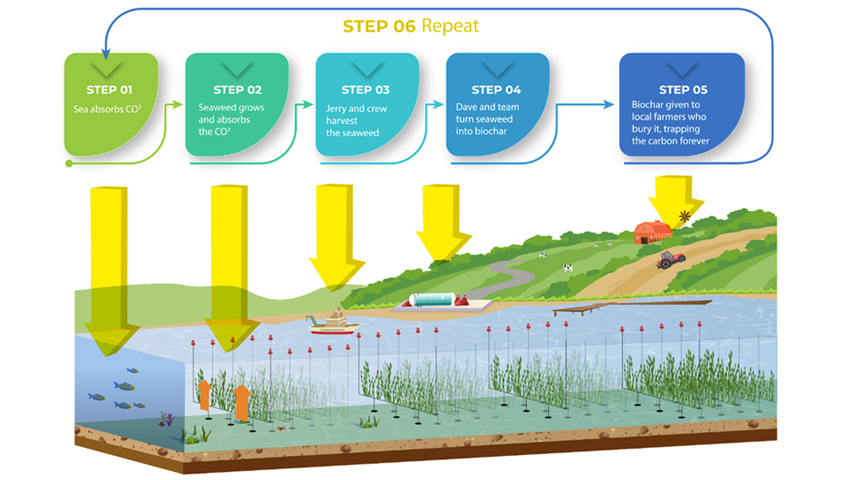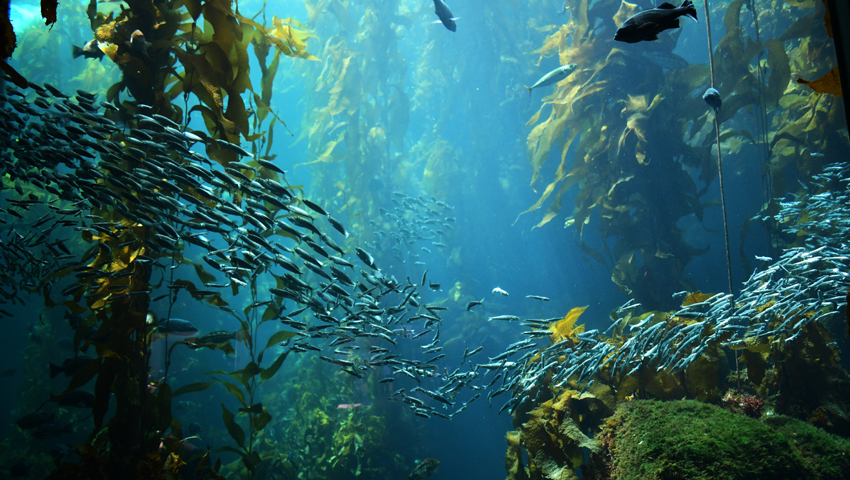OCEAN warming due to climate change has reached record levels, impacting marine ecosystems and the livelihoods it supports. But nature-based solutions, such as seaweed farms capturing and storing carbon, can help to tackle climate change and restore vital biodiversity.
A few years ago, watching a climate change documentary gave Howard Gunstock and his business partner Dave Walker-Nix a lightbulb moment. There was a graphic showing a “mythical machine”, yet to be invented, which could suck carbon dioxide out of the air.
“The joke was, ‘If only there was something that could do this naturally’, and of course there is – it’s trees,” Gunstock recently told the World Economic Forum. “Then Dave said, ‘Seaweed grows 30 times faster than trees’.”
That moment sowed the seeds of Carbon Kapture, a sustainability start-up calling for companies and individuals to sponsor ropes growing seaweed on its first seaweed farm, a partnership with shellfish farmers to grow kelp in Ireland’s Mulroy Bay.
The seaweed is harvested and turned into biochar, through a heating process called pyrolysis which is rich in carbon and nutrients, that the company then plans to donate to local farmers, to enrich soil and reduce the need for fertilizer.

“We want to create a circular ecology business model, effectively using nature to help nature to bring back some balance to the imbalance of man-made climate change,” Gunstock told the World Economic Forum.
Gunstock says “We’re a blue planet not a green planet – two out of every three breaths we take comes from oxygen created by life in our oceans, but they’re in such poor health.”
The ocean is home to around 226,000 species that we know of so far – but so much of it remains undiscovered and the real total could be closer to 700,000, according to UNESCO. It also supports the livelihood of more than 3 billion people, but much of our focus on efforts to tackle the impacts of climate change has been on land and the ocean is suffering.
In April 2023, sea surface temperatures reached record levels and ocean warming is already adversely affecting food production from fisheries and shellfish aquaculture.
Nature-based solutions benefit biodiversity and human life, helping restore ecosystems and mitigate climate change. Carbon Kapture’s seaweed farm has the potential to scale to 250 hectares and grow around 11,000 tonnes of seaweed per year. This will boost biodiversity and water quality in Mulroy Bay, as well as sequester carbon in biochar, which helps to improve soil quality.
“The oceans heal faster than anything else on the planet, so you can actually repopulate fish and marine stocks in certain areas within four or five years,” says Gunstock.
“The phrase is, ‘Where seaweed grows, marine life flourishes’, so with seaweed there’s a real opportunity to do something significant to bring back some balance and restore life to our oceans to a state where it’s sustainable again.”
The company has already had a positive response, with academics and farmers reaching out from as far away as Australia – and the potential to grow is exciting, says Paul Rees, Carbon Kapture’s Chief Revenue Officer. “We can scale globally by opening new farms with multinational organizations looking to restore balance to the communities they impact the most. We aim to establish a global network of 200 farms over the next 10 years, which could capture over 364,000t of CO2 per year.”
Carbon Kapture is the latest in a growing global roster of seaweed start-ups, many of which are part of the World Economic Forum’s UpLink community, a platform connecting social innovators with experts and investors to accelerate impact.
